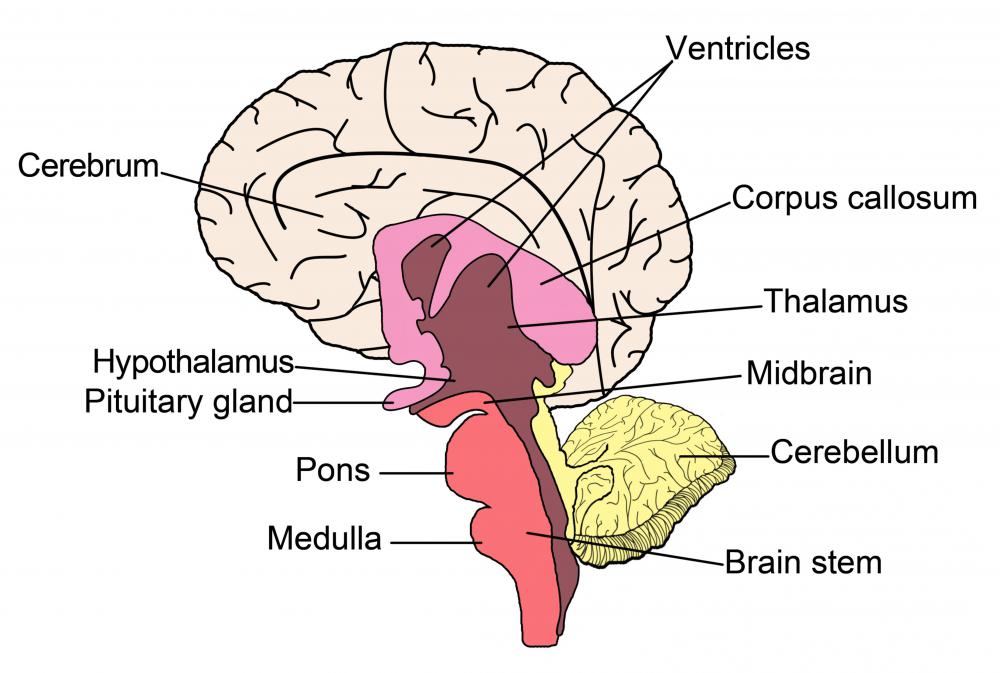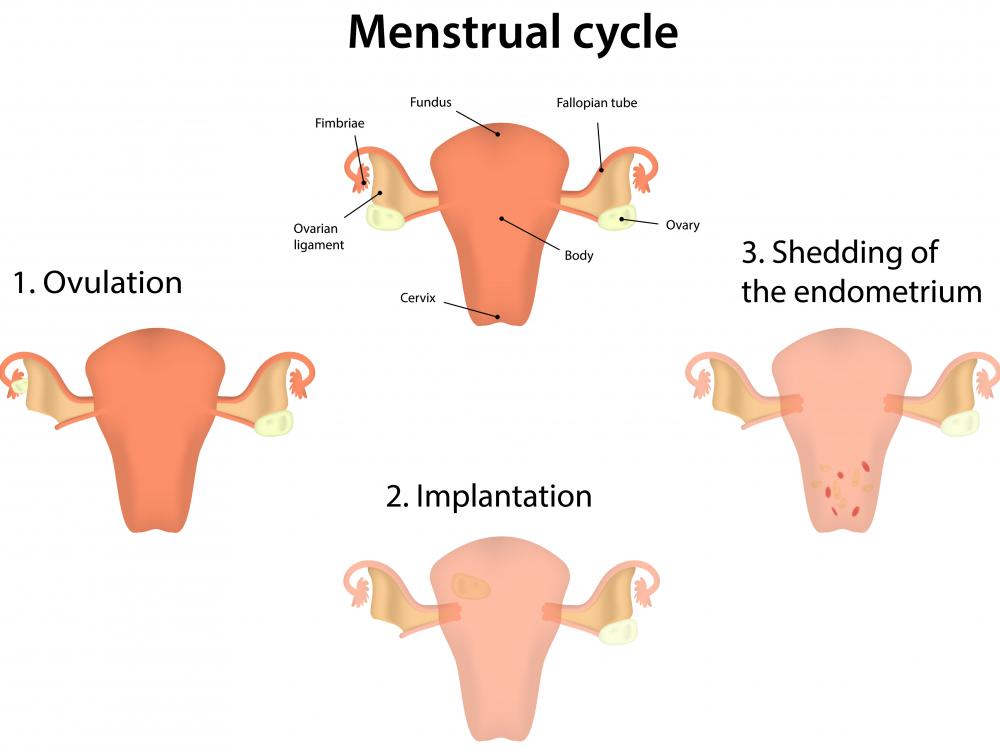At WiseGEEK, we're committed to delivering accurate, trustworthy information. Our expert-authored content is rigorously fact-checked and sourced from credible authorities. Discover how we uphold the highest standards in providing you with reliable knowledge.
What are the Effects of Prolactin in Women?
Prolactin (PRL) has many physiological effects on women. Also known as luteotropic (LTH) hormone, it is regulated by the PRL gene. Perhaps the most well-known effects of prolactin in women are on the mammary gland, where they regulate the production of milk, or lactation. PRL is also partly responsible for development of mammary tissue during adolescence and pregnancy. It is considered a multi-function hormone, meaning it has many other more subtle effects on the body, including in the areas of ovulation and the maintenance of other fertility mechanisms.
The PRL gene stimulates the production of PRL from lactotrophs located in the anterior pituitary region inside the brain. In addition, it has been discovered that other tissues secrete the hormone on their own. For example, the uterus produces its own prolactin while it is maintaining pregnancy, and immune cells also produce it when they are stimulated. Most cells within the human body contain PRL receptors, and for this reason, researchers believe that the effects of this hormone are more numerous than originally thought. The phenomenon known as “nesting,” which is a behavioral change exhibited by a woman as she gets close to delivering a baby, is believed to be caused by a rise in PRL toward the end of pregnancy.

The effects of prolactin in women who are getting ready to breastfeed a child is paramount. If there is a dysfunction within the system, a woman will be unable to physiologically produce enough milk to nourish a baby. There are two major roles that PRL plays in the production of milk, the first being to increase the lobuloalveolar growth of mammary tissues. The growth of alveoli, which are clusters of small cells inside the breast, enable the tissue to prepare for the storage of lactate. After birth, PRL stimulates lactogenesis, or the production of milk and the letdown of milk for expression.

A study done on mice confirmed a link between the PRL gene and the inability of female mice to produce enough milk after pregnancy. The mice were genetically altered to possess two deletion PLR genes, and while they were still able to produce prolactin from other sources, were unable to produce a substantial amount of milk after giving birth. The effects of prolactin in women with cases of infertility are being studied, which may lead to alternative fertility treatments.
AS FEATURED ON:
AS FEATURED ON:















Discussion Comments
I actually started producing breast milk about a year ago, I'm not pregnant nor do I have children. I went to the doctor and she did blood work. My prolactin level was high so she ordered an MRI. It showed a tumor pressing on my pituitary gland. She put me on medication. Since it was small enough, and wasn't pressing on any nerves, it did not require surgery. Every time I go to the doctor she asks if I have vision changes or headaches.
@turkay1: I would ask your doctor for an mri scan as your symptoms suggest you may have a prolactin secreting tumour on your pituitary gland.
I went to the hospital and was told I needed a hormonal profile to find out the reason why I leak, but during the discussion, the doctor told me about some scary things like brain cancer, breast cancer, etc. I was dumbfounded and scared, but recently I returned to the lab to find out about the procedure, because it's embarrassing. I am booked to have the test and am all excited and for once, it's good to take matters of your health seriously, especially as a woman.
I am glad to read through the comments and experiences of the others. It's indeed, brave of us all to come out and speak of matters that affect us.
I had elevated prolactin levels which affected ovulation even though I still got my period. I took dostinex and levels returned to normal within a week. After only one pill, I got pregnant. This happened more than once.
I have been married for two years but after starting my period I have been observing that my breasts are abnormal; if I press them I find some milk from them. The level of my prolactin is around 570ml. What can I do now?
I have been trying to conceive for the last year. Lately I went to see a doctor, and found I have elevated prolactin hormones. The doctor told me that high prolactin inhibits ovulation. I am currently taking some medicines and hoping for the best soon.
@anon315112: Well, if you had just had a baby, your friends *might* be right, but since you've never had a baby, no they are not right. If you think you're pregnant, you need to get a home pregnancy test and check it out.
Some women do produce small amounts of milk, even though they're not pregnant. Your doctor can explain this to you.
I have never had a baby, but still I'm getting milk from my breasts. My prolactin level is all right, but still getting much less. When I press my breast hard only then the milk comes, so my friends are saying if I can get milk from my breast, I can't be pregnant. Is this correct?
@fify-- That makes sense. Since prolactin plays a role in lactation, it's really high when women are making breast milk. I think it's not possible to ovulate and conceive during lactation. The reason must be high prolactin levels.
I wonder if prolactin has anything to do with miscarriage? My sister-in-law has had two miscarriages and I remember her saying something about her prolactin levels.
I've also heard that low or elevated prolactin levels causes an increase or decrease in body hair. So I guess prolactin has too do with body hair production as well.
@fify - I have never had a problem with high prolactin when I'm not pregnant or breastfeeding, but while nursing I have definitely noticed how prolactin levels in women affect your system.
The drop in your estrogen levels is probably the most noticeable. It's why lactating women usually don't get their period back for several months, or even over a year. It also causes a loss of bone density, but that's temporary - when you are done breastfeeding, your bones regain their lost density (possibly even stronger than they were before). I can see how the loss of bone density, in particular, would be a problem if you had abnormally high levels of prolactin outside pregnancy/nursing. And doesn't estrogen protect against heart disease as well?
Vaginal dryness and painful intercourse are other side effects of low estrogen that many women will notice. I think it's important to just be patient with yourself and give yourself time - knowing the hormonal causes of what you're going through, I find, can really help.
@turkay1-- Yea, I would agree with that. That's why if a woman is having a problem with fertility, prolactin is one of the hormones that they do a test for because it has a direct affect on fertility health.
I also used to have high prolactin levels. I didn't have an irregular period, but my breasts were leaking milk even though I was not pregnant. My doctor prescribed a medication that lowered my prolactin to normal. I'm still taking it.
At that time, my doctor had also asked me if I had been trying to conceive since I was newly married. Apparently, having high prolactin affects the production of estrogen which is necessary to conceive.
I think doctors are aware of how important the prolactin hormone is and always test for it in addition to progesterone, estrogen, androgen and so forth when there is a reproductive issue.
I completely agree that prolactin is very important in women, it seems to affect the entire reproductive system and how it functions. I've had very high prolactin counts for the past couple of years. I had gone to the doctor because of irregular periods and found out then that my prolactin levels are much higher than normal.
Since then, I've also been dealing with low libidio (basically none) and headaches more than usual. My doctor feels that these are also side effects of having high prolactin. I don't know what's causing my prolactin levels to rise, but I've definitely learned in these several years that prolactin is very important in how the reproduction system functions.
I think that higher or lower than usual amount of prolactin messes with the female reproductive hormones. Is anyone else suffering from this? Would you agree with this statement?
Post your comments